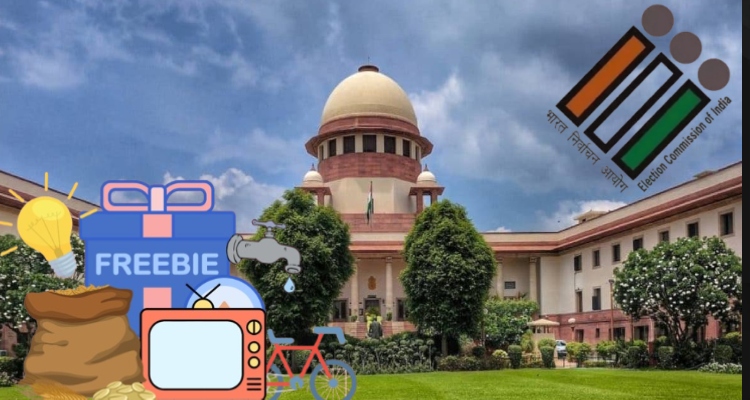
The Supreme Court has recently issued a notice to the Centre and the Election Commission of India regarding a plea that seeks to classify promises of freebies made by political parties during election campaigns as bribes.
A bench led by Chief Justice of India D.Y. Chandrachud has tagged this petition alongside other pending cases for consideration.
The plea, filed by Karnataka resident Shashank J. Shreedhara, calls for the Election Commission to implement immediate measures to prohibit political parties from making such promises in the lead-up to elections.
Through advocates Vishwaditya Sharma and Balaji Srinivasan, the petition argues that unregulated promises of freebies impose significant financial burdens on taxpayers and that there is no mechanism in place to ensure that these pre-election commitments are fulfilled.
The petition asserts that promises of freebies especially in cash made by political parties during Assembly or General elections, which are to be funded from public resources if the party comes to power, should be regarded as a corrupt practice under the Representation of the People Act, 1951.
It highlights that parties frequently announce these freebies without disclosing their funding sources, leading to a lack of transparency.
This opacity often results in unfulfilled promises, which the petitioner claims constitutes fraud on the electorate. The plea further argues that such practices create an uneven electoral landscape, where voters are swayed not by candidates’ policies or governance records but by the prospect of immediate benefits.
Consequently, this reduces the electoral process to a transactional one, where votes are effectively bought through future rewards.
The petition underscores that despite the increasing prevalence of these pre-poll promises, the Election Commission has failed to take adequate action to address the issue.
It emphasizes that the Commission, as the guardian of free and fair elections, has a constitutional obligation to prevent unethical practices and ensure that elections maintain the integrity of democracy.
As the Supreme Court considers this matter, the outcome may have significant implications for how political parties campaign and the ethical standards governing electoral promises in India.




